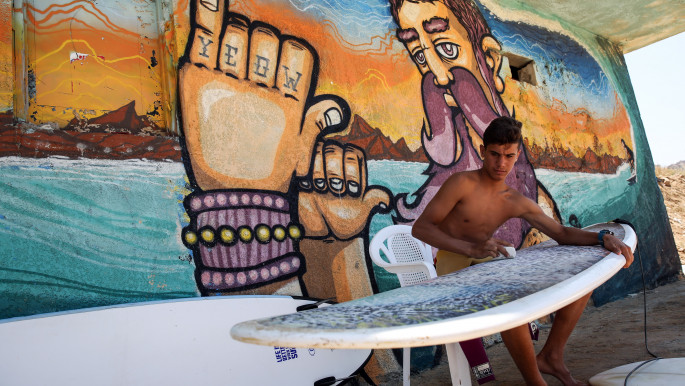Making waves in Lebanon: The Mediterranean's newest surfing destination
Lebanon's picturesque beaches have made the country the Eastern Mediterranean's go-to tourist destination for Arabs and Europeans, but quite a few locals take to Lebanon's lengthy coast with a different activity in mind: surfing.
Though still tiny, the growing subculture of Lebanese surfers has benefited athletes and entrepreneurs alike as the Polynesian-origin sport turns into a pastime for some and a business for others.
Lebanon now hosts three schools for training surfers: Batroun Water Sports in Batroun, Board'n'Surf in Byblos, and Surf Lebanon in Jieh.
"Surfing has always been popular all over!" said Ali Elamine, who founded Surf Lebanon after moving to Lebanon from California.
"We have a great coast to be used for all sorts of water activities. Surfing is not a very expensive sport to get into if you are not trying to turn pro."
Surfing has managed to appeal to Lebanese across the boundaries of age, gender, and religion. In Jieh, Christians and Muslims, men and women, and the young and the old all surf the Lebanese coast.
Lena Allam has become one of Lebanon's most prominent female surfers, and the sport is gaining popularity with other women across the country.
The Office of the United Nations High Commissioner for Refugees also highlighted the case of a Syrian refugee who taught himself to surf after fleeing Aleppo and seeing the sea for the first time when he arrived in Lebanon.
"Lebanon is a good location for a few reasons," Elamine told The New Arab. "It has waves, and we are on the receiving end of the Mediterranean. We also get swells from any storm activity in Italy and Malta and even a short fetched swell from in front of Turkey."
 |
|
| Ali Kassem, a 17-year-old Syrian refugee, waxes his surfboard before going surfing on a beach in the town of Jiyeh [Getty] |
Despite Lebanon's prime location at the edge of the Mediterranean Sea and Lebanese surfers' increasing celebrity, surfing remains far less popular there than other sports, such as football.
"I wouldn't say surfing has become popular in Lebanon," observed Paul Abbas, Lebanon's only surfboard shaper and owner of PA Surfboards.
"Still, 99 percent of people don't know it exists here and think we don't even have waves in Lebanon. But it's true that, in recent years, it's been gaining more popularity – especially among people who are sea- and outdoors-minded."
Abbas himself serves as an example. When he first launched his business, Abbas needed to keep working his other, full-time job at a television station to pay bills. Now, however, he has enough customers that he can dedicate all his attention to surfing and PA Surfboards.
The sport itself has transformed in the years since a small band of adventurous Lebanese started surfing in the early 1970s, prior to the destruction and heartbreak that would result from the Lebanese Civil War.
"It was a slow rise in popularity," Abbas told The New Arab. "There were maybe fifteen surfers in the 1990s and maybe forty around 2010. Now, I think there are about three hundred surfers, of whom only 150 are hardcore surfers who surf all year round."
Some Lebanese surfers put their community's membership at an even smaller number, admitting that, while surfing is gaining ground in Lebanon, the sport has a long way to go.
"The community is not that big – probably one hundred surfers max," estimated Elie Hage, a Belgian-Lebanese surfer who moved to Lebanon seven years ago.
"When I started six years ago, there were maybe ten surfers. Surfing is picking up but at a very slow pace."
As surfing expands in Lebanon, the sport is also developing a foothold in some other corners of the Eastern Mediterranean.
Egypt, Israel, and Turkey are beginning to attract their own throngs of surfers. In fact, the sport has reached the edges of Western Asia and North Africa. Expatriates based in Dubai flock to Masirah Island in Oman to surf, and Morocco has built an even stronger community of surfers than Lebanon. Algeria too joined the International Surfing Association in 2014.
Lebanese will nonetheless give surfers in all these countries stiff competition.
"Lebanon gets very good waves in the winter," noted Hage. "It is definitely a good destination to surf, and it's an amazing destination for a lot of other things as well!"
From basketball to skiing, a variety of sports well known in the Western world are gaining some traction in Lebanon.
Reddit users have even wondered whether they can find lacrosse in Beirut. Football seems set to dominate popular culture in Lebanon for years to come, but the handful of Lebanese surfers seem more than happy with their locale and tight-knit community.
"We're lucky in Lebanon to have the waves we have: we get to surf all year round," said Abbas. "The waves are good quality – especially in winter – and the water isn't too cold. In summer, we get fewer waves, but being in the warm water enjoying the sun with good friends is priceless."
Austin Bodetti studies the intersection of Islam, culture, and politics in Africa and Asia. He has conducted fieldwork in Bosnia, Indonesia, Iraq, Myanmar, Nicaragua, Oman, South Sudan, Thailand, and Uganda. His research has appeared in The Daily Beast, USA Today, Vox, and Wired.



